
JULIA LEE BARCLAY-MORTON – YOGA, WATER AND REWRITING AUTISM
I interviewed writer Julia Lee Barclay-Morton about her experience of autism. Julia began as an experimental dramatist in New York, moving to the UK to
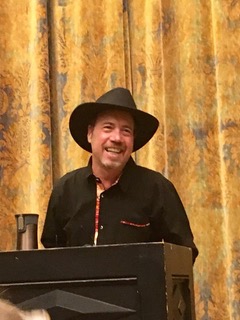
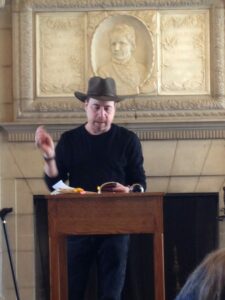
In this guest blog, international poet and translator Mark Statman describes his move from the USA to Mexico and his feelings about President Trump’s election. As former associate professor of Literary Studies at Eugene Lang College, Mark Statman’s translations include Federico García Lorca‘s Poet in New York, José María Hinojosa’s poetry and a forthcoming collection, Never Made in America: Selected Poems from Martín Barea Mattos, out in April. Mark’s own original poetry collections include A Map of the Winds and That Train Again.
Mark writes:
after Julie London sings cry me a river on my phone
a lizard scatters steps across the road
some moving too fast bird
moves too fast into a white-flowered tree
in Virginia at night on the Cow Pasture River
Jim talked about hearing dogs bark in the next county
that quiet the night
but in this valley a few thousand miles south
with its five thousand year old view
five thousand and more
five and forever
I sometimes think that everything
I hear happens to be what isn’t there
except for the midday
church bells
in that town kilometers away
I can see the orange dome
two brown towers
being here
was once
like falling in love
and being here now
is being
to the east, north east
over a green hill that rolls into itself
against a backdrop of hazy white and blue
a single cloud, once bulky
dissolves
so that there it isn’t, gone
as a single memory against memory
and against memories, remembering
I want to write more about the move, more about what it feels like to be an expatriate, what it feels like to live in the tropics, in a place where we talk about four seasons but one feels only two: rainy, dry. I want to write more about what it means to live in a mountain city where there´s no snow, where the trees are in flower year-long: orange, yellow, white, purple, pink. Where it seems like everywhere you turn there is music, musicians on the street, music from homes, from cars, bars, in parks, on plazas. I want to write more about the strangeness of settling in, what it feels like to realize that one now lives in a place one has loved to visit, how the small city changes because though one is always hopefully a tourist in one’s own life, there is something else when the strange new house you live in is now your home.
And I will write that. Soon. But right now, I feel compelled to write something else.
* * *
A lot of my friends have been asking, how did you know? How did you know? In the face of our national nightmare, how did you know to move, get out get out get out?
We didn’t, but looking back only a few months, how lucky I feel, lucky we are, that we did it anyway.
* * *
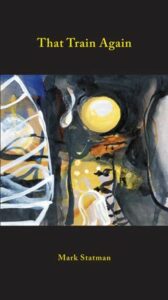
We didn’t leave because of Trump. We had no clue—how many of us did? Here, the day after the election, the newspaper headlines reflected a great fear and a great horror at what had happened, Mexicans on the left and right, Mexicans in the center, knowing this wouldn’t be good for Mexico. In the market that day, I was talking with someone and he asked me how it had happened. He asked me how, if Hillary Clinton had received the popular vote, she hadn’t won. I tried to explain the Electoral College, how it worked, its peculiar logic. He shook his head. Here in Mexico, he said, we expect false elections. From the United States, we expect something better. You’re no better than we are.
* * *
Last May, 2016, at the age of 54, my good friend, the poet and scholar, Robin Mookerjee, died, suddenly, unexpectedly. Robin and I taught together in the Literary Studies department at Eugene Lang College at The New School in New York City, where I had been teaching for 31 years.
Robin’s death was a catalyzing moment for me. At the time, I was a few weeks short of my 58th birthday and this loss, sudden, awful, brought home to me in a way I hadn’t experienced before the closeness of the end of life, that at best, I was in the less than last third of my own.
And so, after some intense and careful thinking, my wife, the painter and writer, Katherine Koch, along with our son, the musician, Jesse “Cannonball” Statman, decided to sell our Brooklyn home of 25 years. Katherine and I would move to Oaxaca, Mexico. Jesse would accompany us, help set up our new home, before taking off on a 4 month tour of the US and Europe.
This was not an easy thing to do. We’re all three New Yorkers, Jesse all his life, Katherine and me most of ours. Brooklyn is a borough that gets under your skin, into your blood, the oxygen in its air has always felt essential to me. The city has been a central part of my writing, the place where I’ve done my teaching, my thinking. It’s where Katherine and I fell in love.
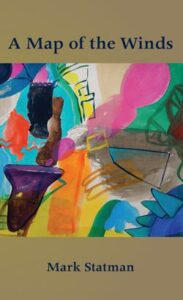
But our neighborhood had started to feel different, the changing skyline, the bookstores and florists, bakeries, butchers, with rising rents, giving way to real estate offices, cellphone stores, and nail salon spas.
The decision made, our home on the market, I informed the university that I was retiring from teaching. Which was pretty hard to do. Lang College had been a second home to me for a very long time. I had friends there of many years, I’ve remained close to students long after graduation. But even as someone who loves to teach, I’d been feeling more and more the pull of my own writing. Given that I still have three books left on my current book contract, I felt less like I was ending something and more like I was continuing on a trajectory started a long time ago.
* * *
In the best of circumstances, I think it must be hard to be a U.S. citizen living abroad. But I know right now it’s even harder at home because I’ve talked with friends. One said all she could do was cry. Another said the city felt the way it did in the days after 9/11. An attack on the city. An attack on the country. An attack on the world.
* * *
What technology does. We watched the returns on CNN. The place to grieve publicly provided by Facebook. To express outrage by Twitter.
* * *
How awful is this? Since Election Day in the U.S., the peso has dropped 12% against the dollar. The Mexican economy expects to do worse and worse in the year ahead. Politicians are scrambling to figure out how to deal with the sudden forced return of citizens to an economy that can’t support them. Workers. Students. And the divided families. The worse-than-Trump-in-the-polls-President of Mexico, Enrique Peña Nieto greets the 150 or so first wave of Trump deportees in Mexico City, telling them this, their home, is ready for them. But is it? One of the greeted says to a journalist, as soon as I earn $5,000 (U.S.), I’m going to cross the border again to be with my wife.
The brightest news seems to be that that wall, should it be built, would be built by Mexican labor. The concrete provided by Cemex, of Mexico.
* * *
I’m embarrassed. Is that it? Maybe better, ashamed? As a poet, I’m ashamed of the language used, the lies, the construction of alternative facts, of alternative realities that are designed to appeal to the worst in any of us. As a Jew, whose family fled Eastern Europe, whose family died in Eastern Europe, I’m ashamed of a revision of the Holocaust, of the anti-immigrant, anti-Muslim policies of my government. As a citizen, I’m ashamed of the willingness of too many of my fellow citizens to allow this nightmare to become normal.
* * *
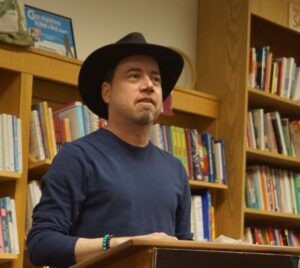
Somehow, though, I don’t feel defeated. Myles Horton reminds us that uniting love and social justice is a long haul. The day after the election I said to Katherine that the same work needed to be done, it was just going to be a little harder than we’d expected. And hasn’t this shaken a lot of people, a shock to a collective nervous system, hasn’t this election been a call for an unprecedented mobilization? The day of the women’s marches across the US and across the world, there was a march here in Oaxaca. Organizers expected 100 people, 200. They didn’t expect 2000. They didn’t expect this gathering of international expats, holding signs, waving U.S., Canadian, and Mexican flags. They didn’t expect that as the marchers moved from the plaza in front of the Santo Domingo church down to the zocalo, the main city square, that there would be people on the sidewalks cheering them as they passed.
Cheering because of resistance to this nightmare, of defiance. Cheering because the marching was not just against Trump, it was for something better. It was for hope, for beauty, for justice, for peace. Cheering because the belief in and the work for a better world is always what democracy looks like.
–Mark Statman, Oaxaca de Júarez, Oaxaca, MX, February 2017
Next week, Polish-born photographer ALICJA O’SULLIVAN, whose pictures have been exhibited in several major cities and in Italian Vogue, writes about what inspires her.
ABOUT LESLIE TATE’S BOOKS:

I interviewed writer Julia Lee Barclay-Morton about her experience of autism. Julia began as an experimental dramatist in New York, moving to the UK to

I interviewed Gillean McDougall from Glasgow, who edited the collaborative projects Honest Error (on Charles Rennie Mackintosh and his wife Margaret Macdonald) and Writing the

I interviewed French writer Delphine de Vigan, whose book, No et moi, won the prestigious Prix des libraires. Other books of hers have won a clutch

I interviewed Joanne Limburg whose poetry collection Feminismo was shortlisted for the Forward Prize for Best First Collection; another collection, Paraphernalia, was a Poetry Book Society Recommendation. Joanne

I interviewed Katherine Magnoli about The Adventures of KatGirl, her book about a wheelchair heroine, and Katherine’s journey from low self-esteem into authorial/radio success and
| Cookie | Duration | Description |
|---|---|---|
| cookielawinfo-checkbox-analytics | 11 months | This cookie is set by GDPR Cookie Consent plugin. The cookie is used to store the user consent for the cookies in the category "Analytics". |
| cookielawinfo-checkbox-functional | 11 months | The cookie is set by GDPR cookie consent to record the user consent for the cookies in the category "Functional". |
| cookielawinfo-checkbox-necessary | 11 months | This cookie is set by GDPR Cookie Consent plugin. The cookies is used to store the user consent for the cookies in the category "Necessary". |
| cookielawinfo-checkbox-others | 11 months | This cookie is set by GDPR Cookie Consent plugin. The cookie is used to store the user consent for the cookies in the category "Other. |
| cookielawinfo-checkbox-performance | 11 months | This cookie is set by GDPR Cookie Consent plugin. The cookie is used to store the user consent for the cookies in the category "Performance". |
| viewed_cookie_policy | 11 months | The cookie is set by the GDPR Cookie Consent plugin and is used to store whether or not user has consented to the use of cookies. It does not store any personal data. |
3 responses
Mark’s blog is as beautifully written as his poetry. It is clear to me that both the poetry and the prose come from the heart.
Yes indeed. Thank you, Leslie 🙂 🙂 🙂
Thank you, Sal.